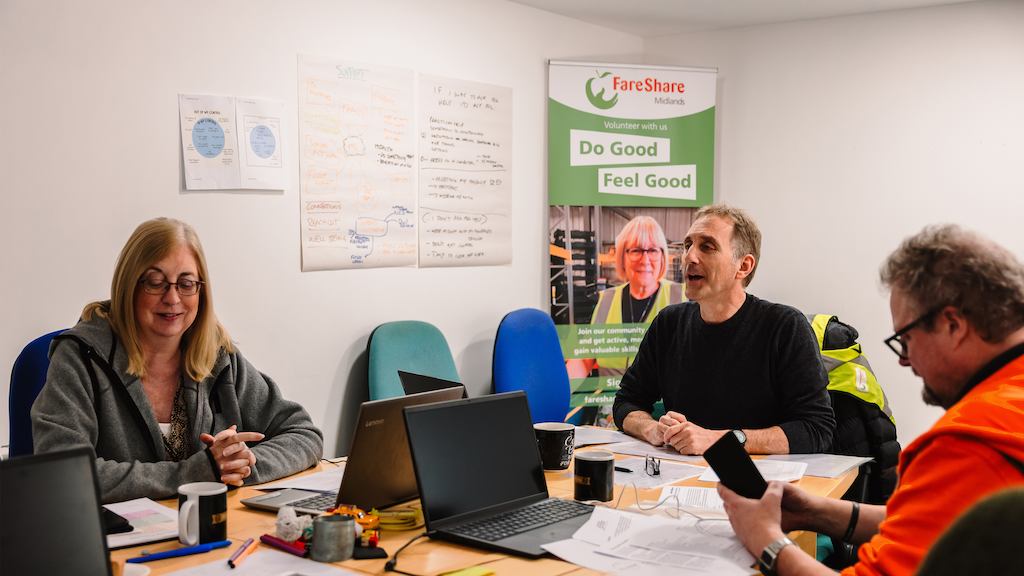At Ageing Better, we’re working on several projects that show how different people have different needs—and how tailored support can support older workers on the journey from being inactive to opportunity to good work.
Supporting Disabled Older Workers
Our Supporting Disabled Older Workers (SDOW) project launched last year and has been designed to develop new policy and practice to improve support for Disabled people and people with long-term health conditions in their 50s and 60s who want to find and stay in work.
Working with The Policy Institute at King’s College London, we’ve brought together a group of Experts by Experience to shape the project, using their insights to guide our approach.
One of the real successes of this project has been to make sure that people are given the space to share their own experiences with those who have the power to bring about change.
We look forward to sharing what we have learned through the process with the launch of the report in September and we hope that will then lead to further opportunities to work with others to provide more opportunities for those who live with disability to be heard and have the opportunity to shape their own journey to good work.
Support to Succeed
Using insights from our partnership with design organisation Humanly, Greater Manchester Combined Authority commissioned a new voluntary programme for economically inactive Greater Manchester residents who are furthest away from the labour market, to address barriers and achieve positive outcomes.
We know that the chances of getting a job from employment support declines steadily with age. In order to help buck that trend, it is vital employment support has an age-lens.
The Support to Succeed programme has been running since 2024, with a dedicated support offer designed with people over 50 in mind. Ageing Better have been working with partners NatCen and WPI Economics to evaluate the first year of activity, which saw over 1500 participants aged over 50 access support to progress away from inactivity and closer to good work.
This voluntary and tailored service has highlighted the importance and impact of providing support to people to improve their confidence in looking for work, in engaging in social situations and in thinking about their own goals and aspirations.
Steps to Your Goal
Economic inactivity varies significantly across the country with some of the highest levels of inactivity to be found in former industrial heartlands which have entered into decline. Economic inactivity in Middlesbrough is higher than across the North East and Great Britain.
So our work with Triage Impact and HealthFind in Middlesbrough has focused on providing holistic support to help guide people from often entrenched economic inactivity towards opportunity and hopefully onwards to good work.
In this project, we’ve seen the same model of support developed in Greater Manchester, taken and delivered to those already accessing services along with added dedicated mental and physical health support.
This pilot project has highlighted the importance of voluntary, tailored provision to people in their 50s, 60s and beyond who want or need to work, with one in five (20%) of those on the programme finding work and a further 6% receiving self-employment support.
From this project we have recognised that allowing people to be heard and to be active in the journey towards employment, whilst also receiving support to help them manage different parts of their day-to-day lives, can be critical to their chances of finding and keeping good work.
Redundancy Support for Older Workers
For people who are being made redundant from life-long or long-term jobs, redundancy can come as a tremendous shock and blow to self-esteem.
The result of going through such a dispiriting process can be falling into economic inactivity. We know that workers made redundant over 50 are three times less likely to return to work within three months than those under 50.
That is why Ageing Better has partnered with Unionlearn to develop a guide for union reps.
This guide provides reps with an overview of the differing levels of support that people aged over 50 may need while experiencing restructure and redundancy.
Redundancy is more likely to impact on people more negatively as they age, and our focus here has been to provide union reps with the tools and knowledge they need to better support individuals and to guide conversations with organisations.
Work is a central part of our lives, and we need to normalise access to good support both in and out of the workplace. Ageing Better is determined that support is available to all, especially older workers.
